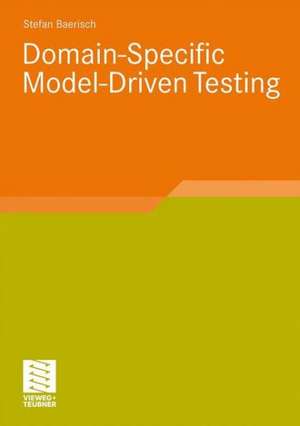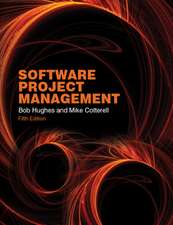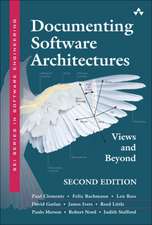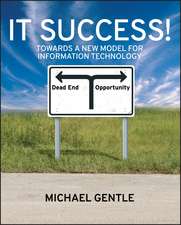Domain-Specific Model-Driven Testing: Software Engineering Research
Autor Stefan Bärischen Limba Engleză Paperback – 26 noi 2009
Preț: 812.43 lei
Preț vechi: 1015.54 lei
-20% Nou
Puncte Express: 1219
Preț estimativ în valută:
155.46€ • 162.72$ • 129.39£
155.46€ • 162.72$ • 129.39£
Carte tipărită la comandă
Livrare economică 31 martie-14 aprilie
Preluare comenzi: 021 569.72.76
Specificații
ISBN-13: 9783834809315
ISBN-10: 3834809314
Pagini: 260
Ilustrații: 260 p.
Dimensiuni: 148 x 210 x 17 mm
Greutate: 0.31 kg
Ediția:2010
Editura: Vieweg+Teubner Verlag
Colecția Vieweg+Teubner Verlag
Seria Software Engineering Research
Locul publicării:Wiesbaden, Germany
ISBN-10: 3834809314
Pagini: 260
Ilustrații: 260 p.
Dimensiuni: 148 x 210 x 17 mm
Greutate: 0.31 kg
Ediția:2010
Editura: Vieweg+Teubner Verlag
Colecția Vieweg+Teubner Verlag
Seria Software Engineering Research
Locul publicării:Wiesbaden, Germany
Public țintă
ResearchCuprins
Testing of Software.- Use of Models in Software Engineering.- System Families and Variability.- Information Retrieval and Digital Libraries.- The MTCC Approach.- Models for System and Test Representation.- Application of MTCC Models.- Application of MTCC to the Digital Library Domain.- Validation Goals and Design.- Results of the Validation.- Related Work.- Summary and Contributions.- Outlook and Conclusion.
Notă biografică
Dr.-Ing. Stefan Baerisch completed his doctoral thesis at the Department of Software Engineering at the Christian Albrechts University, Kiel. He works as a consultant in Oldenburg.
Textul de pe ultima copertă
Software reuse and software quality are increasingly important topics in today’s software engineering both for researchers and for practitioners. The design and implementation of tests is especially challenging when tests are conceptualized for different variants and versions of an application.
Stefan Baerisch applies a combination of feature modelling and code generation, for which he uses a model-driven approach, in order to facilitate the design of tests by non-programmers. Thus, the reuse of tests, represented by abstract test models, for different systems under tests is made possible. The approach uses code generation to allow test execution on heterogeneous and changing implementations. This combination of modelling and code generation allows for a more integrated and more efficient testing process.
Stefan Baerisch applies a combination of feature modelling and code generation, for which he uses a model-driven approach, in order to facilitate the design of tests by non-programmers. Thus, the reuse of tests, represented by abstract test models, for different systems under tests is made possible. The approach uses code generation to allow test execution on heterogeneous and changing implementations. This combination of modelling and code generation allows for a more integrated and more efficient testing process.


















